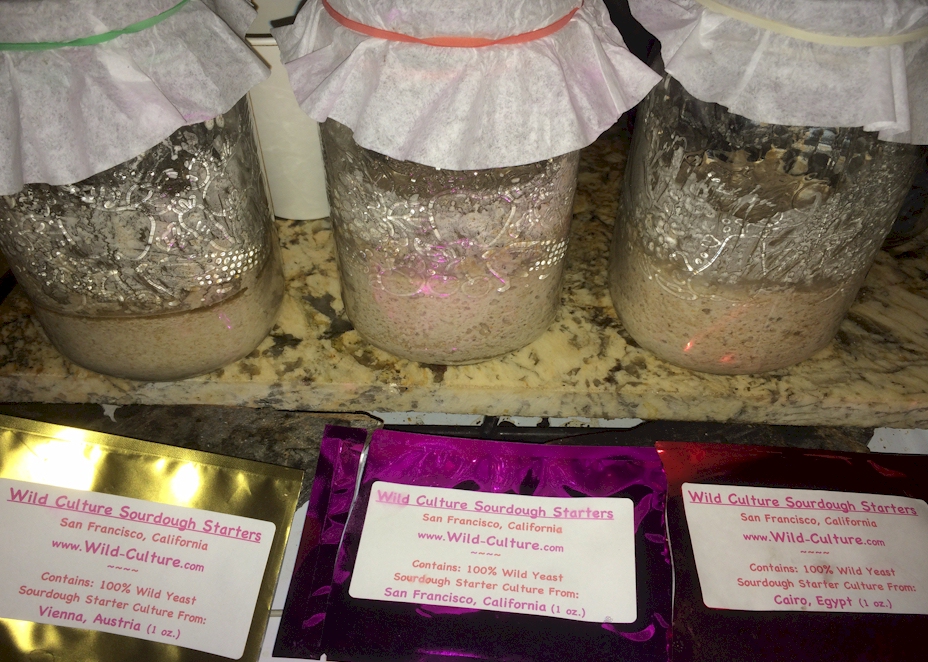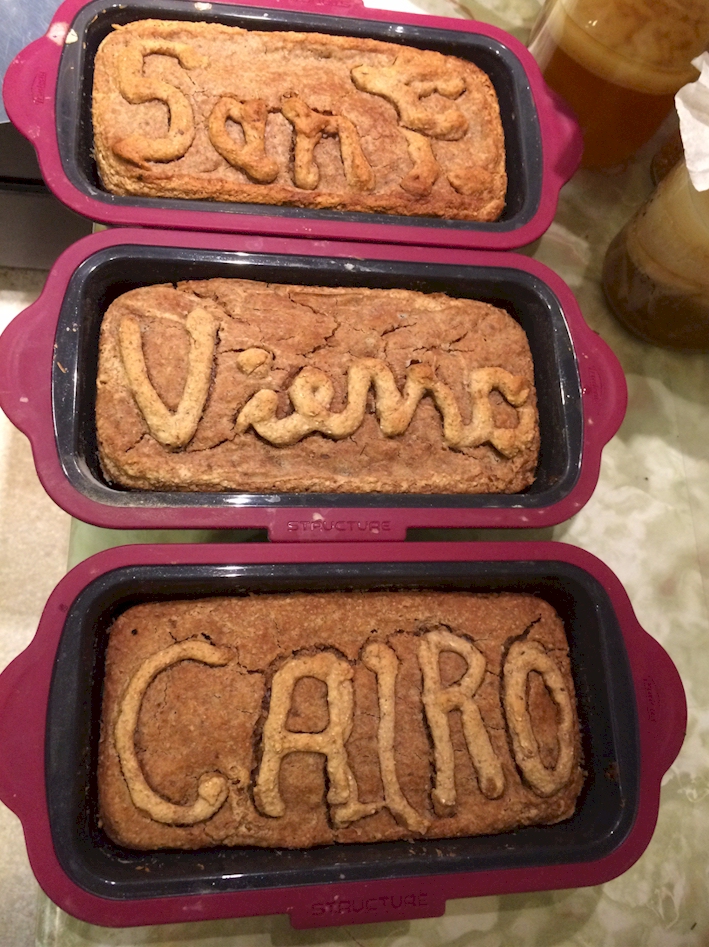
| HOME | Its All About The GUT! | Kombucha Tea | Water Kefir | Milk Kefir | Sprouts | Wild Fermenting | Kimchi |
SOURDOUGH STARTERS FROM AROUND THE WORLD

~
|
Its All About The Gut.com
Benefits of Sourdough & Daniel's Findings
Mon, Jan 16, 2017
Here's a summary of the many benefits of sourdough, as revealed by
research done in the past fifteen years:
·Basic
life preservation of grains is to be indigestible, thus pass through an
animal as a pre-fertilized seed, ready to grow. These indigestible
compounds are great for ensuring the plants continued fertility, but
they can be harmful to humans, especially in large amounts. Up to 100
years ago all bread was fermented and/or sprouted to allow us to digest
easer. It has been bypassed by our need for speed, and now de-nutriented
faster grains and toxic chemicals make getting nutrients from veggies
much harder. If we are to eat bread/pasta, let us do it the safe way.
·Sourdough
LAB can modify the bits of gliadin and glutenin protein in wheat flour
that are toxic to people with coeliac
disease (CD) and non-coeliac gluten sensitivity(2-6). This doesn't mean
CD sufferers can eat all (or even any) sourdough
bread. It does mean that there is a time-honoured method for making
wheat flour more digestible and that we urgently need to know which
types of bread on sale in the shops deploy this to real effect.
·LAB
(including those commonly found in sourdough bread) produce beneficial
compounds: antioxidants (7), the
cancer-preventive
peptide lunasin
(8), and
anti-allergenic
substances,
some of which may help in the treatment
of auto-immune
diseases (9). Interestingly, these by-products
seem able to
survive heating,
suggesting that baked sourdough bread may have
'probiotic' potential (10) by stimulating immune responses in the gut
(11).
·Bread,
especially if made with unrefined flour, is a significant source of
dietary minerals such as iron, calcium,
magnesium and zinc.
But a slice of fast-made wholemeal may be nutritious only in theory if
its
contents pass straight through the body without being absorbed. The main
culprit here is
phytic acid, present in the bran layers of cereals, which 'locks up' the
important minerals.
Several hours of fermentation with sourdough is sufficient to neutralise
phytic acid and
make the minerals more bioavailable (12-13).
·Problematic
protein fragments are not the only thing in bread that we might want to
reduce to a minimum.
Acrylamide, a suspected carcinogen, can be found in bread crusts. Long
fermentation, typical of sourdough systems, can
reduce levels of the amino-acid asparagine that is a precursor of
acrylamide formation (14).
·Bread
is often avoided by those affected by weight-gain and metabolic syndrome
— rightly, perhaps, in the case of
industrial white loaves with a high glycaemic index (GI).
But sourdough LAB produce organic acids that, under the
heat of baking, cause interactions that reduce starch availability.
The lowest GI breads are whole-grain
sourdoughs with a compact texture (15).
© Andrew Whitley 2013
http://www.breadmatters.com/index.php?route=information/information&information_id=34
Daniel's Lessons Learned:
It is totally not necessary to follow any directions or recipe to a "T".
Daniels Rule:
FIRST-
Get your starter on. Take it out of the fridge, drain off top watery
stuff (may be black and have slight mold).
Stir and
remove enough that you can add
a portion of flour mixed with water (one TBSP,1/4 C whatever....it
depends
on the size of your container). Stir furiously, leave covered with
coffee filter in warm location on plate or bowl (in case
it expands too much). Repeat every 8-16 hrs until you can see it
bubbling nicely. It may take 3 days!!!
SECOND-
Make pile of flour & pinch of salt, pour a bunch of starter (about 2
parts starter to 1 part water) mix until
you kneed to. THIRD- Let rise ("proof") as long as you want (6 -18 hrs) to have the lactic acid bacteria do their thing.
FOURTH-
Bake for only 20-40 min depending on thickness at about 400.
Easy —peasy!
Its pretty hard to wreck bread and so much fun to get really good at it!
|

Sourdough Links
|
What is Sourdough? The Benefits of
Sourdough Bread |
http://dontwastethecrumbs.com/2013/06/what-is-sourdough-benefits-of-sourdough-bread/ |
|
The Benefits of Sourdough |
|
|
5 Reasons To Make Sourdough Your
Only Bread |
http://realfoodforager.com/5-reasons-to-make-sourdough-your-only-bread/ |
|
Could sourdough bread be the answer
to the gluten sensitivity epidemic? | Life and style | The Guardian |
|
|
Giving Up Gluten? Why You Should Say
Hello To Sourdough - |
http://www.mindbodygreen.com/0-12354/giving-up-gluten-why-you-should-say-hello-to-sourdough.html |
|
Sourdough and digestibility -
Sustainable Food Trust |
http://sustainablefoodtrust.org/articles/sourdough-and-digestibility/ |
|
Highly efficient gluten degradation
by lactobacilli and fungal proteases during food processing: new
perspectives for celiac disease |
|
|
Moderate decrease of pH by sourdough
fermentation is sufficient to reduce phytate content of whole wheat
flour through endogenous phytase activity |
https://www.ncbi.nlm.nih.gov/pubmed/15631515
|
|
Making bread with sourdough improves
mineral bioavailability from reconstituted whole wheat flour in rats |
https://www.ncbi.nlm.nih.gov/pubmed/12781853
|
|
Fermentation Reduces Free Asparagine
in Dough and Acrylamide Content in Bread |
http://aaccipublications.aaccnet.org/doi/abs/10.1094/CCHEM.2004.81.5.650?journalCode=cchem
|
|
Acrylamide is classified as an
extremely hazardous substance |
https://en.wikipedia.org/wiki/Acrylamide
|
|
Super Easy Gluten Free Sourdough
Starter |
http://wholenewmom.com/recipes/gluten-free-sourdough-starter/ |
|
15 Sourdough Breads To Try: {Baking} |
|
|
machines seem versatile |